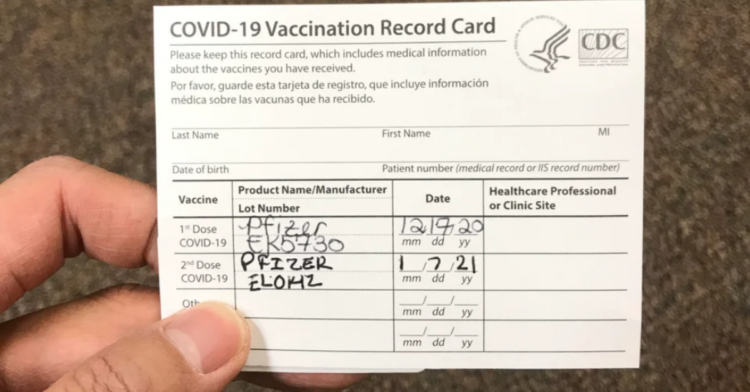Although we can obviously get pretty upset if we lose our phones or if someone compromises our credit card numbers, there are certain things in our lives that we keep even more closely guarded than those.
Because while it’s annoying to get a new phone or cancel a credit card, it can be far more grueling to replace a birth certificate, a passport, or to deal with a compromised social security number. But that care isn’t just based on inconvenience, but rather the fact that those documents are important ways for us to prove that we legally exist.
Fortunately, the card somebody gets after receiving a COVID-19 vaccine isn’t quite as nightmarish to replace as those documents but there are some good reasons why it’s a good idea to treat it with similar care.
If you’re like me and don’t have access to a COVID-19 vaccine yet, there’s a good chance you haven’t seen a card like this in person.

As you can see, it serves as a way to keep track of not only which vaccine you received, but also the lot number the dose was a part of as well as when and where you got the shot.
As you might expect, the most immediate reasons to keep this card on file once you receive it have to do with future vaccinations.

As Salon reported , the vaccines vary on the amount of time you’re supposed to wait in between doses, with the Pfizer/BioNTech vaccine requiring a three-week buffer between jabs and the Moderna one requiring a four-week span of time.
So unless you end up receiving the Johnson & Johnson vaccine, the card will help you figure out when your second dose is supposed to take place.
And as Dr. Krutika Kuppalli from the Johns Hopkins Center for Health Security told ABC News, there’s a chance that the vaccine brand and lot number could become relevant with regards to future booster shots. That seems to depend on the outcomes of various vaccine studies, though.
It’s also possible that the vaccination card will have an important effect on your ability to travel internationally.

This potential was expressed by Amesh Adalja — also from the Johns Hopkins Center for Health Security — who said that because that card is proof of your vaccination, it could make travelling easier by allowing you to get around the quarantining and testing requirements of various nations.
It’s unclear exactly how this idea of “vaccine passports” would be implemented at this time, however.
And even if you don’t plan on going anywhere out of the U.S., your vaccine card could have the potential to keep similar doors open for you domestically.

As John Brownstein, an epidemiologist at Boston Children’s Hospital, told ABC News, “Whether it’s school, entertainment venues or travel, there’s going to be an expectation that to resume these activities you have to be retested and enter quarantine or produce proof of immunization.”
With all of that in mind, what happens if you’ve already discarded or lost your vaccination card?

Fortunately, this is an issue that can be rectified fairly easily. Because while the information on the card itself is important, it’s far from the only place where that information exists.
According to Adalja, both a replacement card and the relevant information to fill it with should be on file where the vaccination occurred. Failing that, your vaccine information is also archived by your state’s department of health.
The only caveat is that this information is usually not shared across state lines, which is good to know if you’re about to move elsewhere.
Of course, it’s easier to avoid having to take that kind of action in the first place.

This is why Dr. Kuppalli advised taking a picture of the card with your phone as soon as you get it and storing the physical card in a similarly safe place as your passport or social security card.
There are also a couple of other safety tips to consider with regards to vaccination cards.

Throughout this article, you’ve likely noticed that some people have taken to posting photos of their cards online. You may also have noticed that in those photos, the information used to identify them was either left blank for the photo or covered up.
If you feel similarly inclined after receiving your vaccine, it would be wise to follow their example with that information.
And while it may seem obvious to avoid these, there is a chance that you’ll encounter ads or individuals claiming to sell vaccination cards. These shouldn’t be interacted with in any way and are all but guaranteed to be fraudulent.
h/t: ABC News

















































